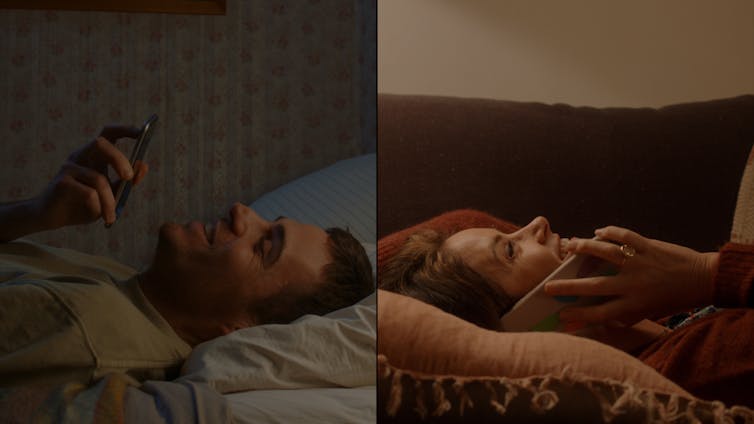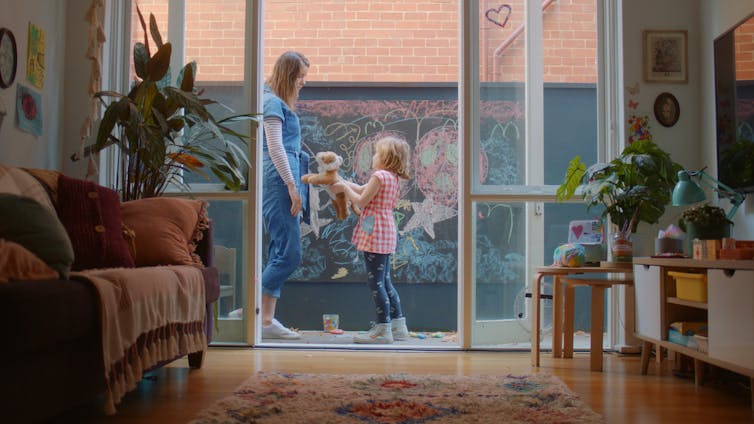Of all the challenges of intimate relationships, finding the balance between separateness and togetherness can be most difficult. It is a balance the COVID-19 lockdown has put to the test.
Loving Captivity is a new six-episode-by-six-minute romantic comedy screening on Facebook about the pleasures and perils of iso-dating. Written and directed by Libby Butler (The Heights, Erinsborough High, Neighbours) and co-written by Lewis Mulholland (On The Ward, Where To Bury Me), who also stars, the creators had a rom-com worthy “meet cute” of their own at an Australian Writer’s Guild speed-dating event where they discovered their shared love for the genre.
Developed through the first COVID-19 lockdown and produced as restrictions were lifting in Melbourne, Loving Captivity follows Ally (Christie Whelan Browne), a 30-something single mum who gives a second chance to Joe (Mullholland) – a “flirt-machine” who dated and dumped her before the pandemic.
Joe’s dumping of Ally and his avoidance of the “boring bits” of relationships is soon revealed as insecurity. He’s afraid he’ll be revealed as uninteresting — a fear intensified by the dull days of lockdown.
As they date over video chat, Joe’s fear diminishes. A romantic rapport is developed through repartee, warmth and facial expressions. (As the pandemic wears on, we may find masks more prohibitive for connection than screens.)
Both actors have comedy experience and the pacing and delivery is natural and unforced, a testament to human versatility in the face of compulsory computer-mediated communication.
Through the couple’s increased contact during the mundanity of lockdown, their banter about relationships, feminism, the friend-zone and the mum-zone gains traction. They pretend to go back in time, courting each other through “love letters in wartime”, evolving into sexting and ending up in a scene featuring a broomstick and banana bread as a memorable form of foreplay.
Whimsy and pain
There’s authenticity to the bite-sized series in the social isolation depicted – a distinctly COVID-19 combination of tension and ennui.
Butler used a minimal crew in the creators’ Melbourne apartments. Split screens show online dates and remind audiences of physical distancing rules. A whimsical night-time picnic has a curious sense of innocence; a welcome antidote for jaded plates in the world of dating (the cheese and wine looked good, too).

The series also offers insight into dating’s more persistent pains.
A scene in episode two reveals a perpetual form of misery that has unfortunately survived the lockdown: Joe stands Ally up. She is left waiting for the call that doesn’t come. Browne captures how the humiliation of being stood up is increased by being alone in a room with no way out.
Another key moment emerges at the end of the series, when Ally (and her daughter Clementine) come face to face with Joe’s sexual presence online. A screen between doesn’t mean there isn’t a need for clear communication and boundary negotiation around the ethics of relationships and parenting.
Human resilience
Both being together alone and being alone together has its problems. Divorce rates in Australia and elsewhere are expected to soar post-lockdown.
Domestic violence rates have reached tragic proportions.
Social isolation has increased rates of abuse from a dangerous partner or family member, and reduced contact with vital support from the outside world.
I am currently researching intimate civility – how we develop our interpersonal ethics in navigating intimate relationships. Key to relationships is how we embody regard for another human being and their physical and mental integrity.
Civility includes qualities such as trust, duty, morality, sacrifice, self-restraint, respect and fairness. Intimacy encourages caring, loyalty, empathy, honesty and self-knowledge.

We develop qualities such as morality and empathy – crucial for intimate relationships – if we have experienced secure, intimate relationships. Intimate civility is a learnt behaviour, both at an interpersonal and societal level. Leaning into this principle may be a challenging task – even without COVID-19.
As Loving Captivity explores, how we attach and separate, how we tolerate and cope with and without each other, may prove to be major factors in the resilience we show not only in the face of coronavirus itself, but also to the long-term social, physical and mental health effects of the lockdown.
Creativity might offer us one of our best ways out. Beyond this period of disruption, we may hopefully look forward to some extraordinary creative outcomes.
In the 14th century, the cultural changes brought about by the Black Death marked the shift from the medieval period to the creative and philosophical outpouring that became the Renaissance – arguably the highest point of humanist and artistic endeavour.
As Loving Captivity shows, our hearts – and heartbreak – will go on. Regardless of our physical proximity, it is human relationships and our humanity to each other that makes the difference to where we go from here.
Loving Captivity is now streaming on Facebook
"captivity" - Google News
July 31, 2020 at 08:15AM
https://ift.tt/30dNnYm
Loving Captivity review: a delightful rom-com captures life under coronavirus - The Conversation AU
"captivity" - Google News
https://ift.tt/3b01anN
https://ift.tt/3dbExxU
Bagikan Berita Ini














0 Response to "Loving Captivity review: a delightful rom-com captures life under coronavirus - The Conversation AU"
Post a Comment